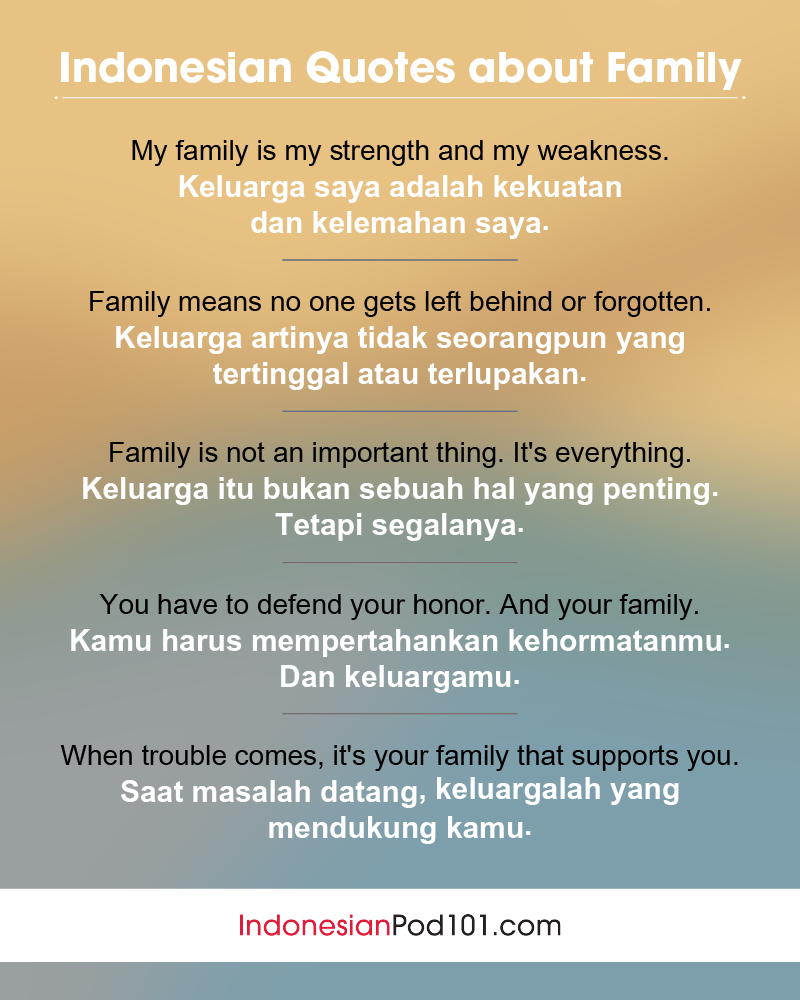Any language student is going to recognize this assignment:
Write a paragraph about your family. Say how old each person is and give their names.
Perhaps it’s a ho-hum writing prompt, but it serves a really important purpose. As it turns out, people talk about their families all the time—and they definitely ask others about theirs.
In Asian cultures, the family usually plays a much more important role than it does in Western cultures. This makes it practical to know how to talk about the family tree in Indonesian, fluently. Are you aware of all the vocabulary and usage that you’ll need in order to truly understand how Indonesians talk about their Indonesian family tree? Below you’ll find all the information you need about Indonesian family terms and the family culture in Indonesia!
Table of Contents
- The Family in Indonesian Culture
- Describing Your Immediate Family
- Your Extended Family
- New Family Members: Indonesian Love and Marriage
- Using Family Words with Ordinary People
- How IndonesianPod101 Can Help You Learn Indonesian Well
1. The Family in Indonesian Culture
When it comes to family values in Indonesian culture, Indonesian families tend to be closer to eahc other than those in Western countries. It’s very likely that people living in a larger house might have three generations under one roof.
Also, families tend to be bigger. The average household size for the USA was 2.6 people in 2018, while in Indonesia it was 3.9 in 2013. However, more and more parents are choosing to have just two children, particularly in urban areas.
The notion of a family representing a close bond is so strong in Indonesian, that a few hundred years ago, the polite way to address someone on the street was saudara ini—literally “this sibling!”
Children are expected to be respectful toward their elders, and that respect holds true even if some family members work overseas, which many do. The sense of connection that an overseas Indonesian has to his or her own family “back home” is quite strong, and many people will make the choice to forego extra savings in exchange for being able to physically travel back to Indonesia when they can.
2. Describing Your Immediate Family
Even if we limit ourselves to just what most Westerners consider a family, don’t be surprised to find that there are quite a few more words here than you’d expect.
Let’s start with parents. A mother is called ibu and a father, bapak. I’m going to put most of the new words in this article into simple sentences so you get an idea of how these words actually work in context.
- Nama ibu Fitri, dan nama bapak Hary.
“The mother’s name is Fitri, and the father’s name is Hary.” - Bapak berusia 40 tahun, dan ibu berusia 39 tahun.
“The father is 40 years old, and the mother is 39 years old.”
Now for “children,” or anak.
- Saya punya dua anak kecil.
“I have two small children.” - Anak saya suka susu.
“My child likes milk.”
As is quite common in languages around the world, Indonesian doesn’t have separate words for male and female children. Thus a son is a “male child” (anak laki-laki), and a daughter is a “female child” (anak perempuan).
Indonesian words for family also describe older and younger siblings with different words. Note the words for “male” and “female” making an appearance again.
| Older | Younger | |
|---|---|---|
| Brother | Kakak laki-laki | Adik laki-laki |
| Sister | Kakak perempuan | Adik perempuan |
That’s about it for the nuclear family in Indonesian. But English doesn’t stop there, and neither does Indonesian.
3. Your Extended Family
The first thing most people think of as “extended” family is the grandparents. The word for “grandmother” is nenek and “grandfather” is kakek. Be sure not to confuse kakek with kakak!
Local languages all over Indonesia have their own words for grandparents, which we won’t get into. But in urban Jakarta, the words are actually opa and oma, instead of kakek and nenek. They’re holdovers from the Dutch colonial times, when certain words filtered down into the Indonesian language. Indonesian is a flexible language! Check out some of the slang words for family members when you’ve got a moment.
- Nenek di mana?
Di belakang rumah.“Where’s Grandmother?”
“In the back of the house.”
Then we naturally have “grandchildren,” or cucu. Naturally, you can add laki-laki and perempuan here to be more specific as well.
- Saya punya tiga cucu—dua laki-laki dan satu perempuan.
“I have three grandchildren—two boys and one girl.”
The word for “cousin” is sepupu, and it doesn’t change based on age or gender. Any child of your parents’ siblings is a sepupu.
Lastly, in Indonesian you would call your “aunt” your bibi and your “uncle” your paman. Here there are again shades of Dutch influence, because some people continue to call their “aunts” tante and their “uncles” oom instead.
- Tante Rere bekerja di mana?
“Where does Aunt Rere work?”
Now let’s take a quick look outside the family…
4. New Family Members: Indonesian Love and Marriage
What do you call your sweetheart in Indonesian?
Many things, probably, though one of the most common pet names is Sayang. Strangely enough, it also means “unfortunately”! Trust me, the two meanings never overlap.
When you’re in a relationship, you call your significant other your pacar, and occasionally you’ll also see the word pasangan meaning “romantic partner.” Neither of these terms is gendered, keeping with the rest of the Indonesian language.
After the wedding (the pernikahan), the two parties are suddenly called suami meaning “husband” and istri meaning “wife.” This is often considered the moment when a person becomes an adult in Indonesian culture.
In fact, there’s a common question that people ask in Indonesia that would be rather rude in Western cultures.
- Sudah menikah?
“Are you married yet?”
Culturally, the only two acceptable answers to this are belum meaning “not yet” or sudah meaning “yes, already.” It’s either happening sometime or it already has—it would really throw people off to answer directly in the negative. Indonesians who are used to attending family reunions understand that this question comes left, right, and center.
In English, there are, of course, new names for parents after marriage—namely, the “in-laws.” Indonesian actually has words that map pretty directly onto the English equivalents, so you don’t have to do any memory games or mental gymnastics to figure these out.
One’s “parents-in-law” are known as mertua, regardless of whether they’re on the bride’s or groom’s side. And then “siblings-in-law” are known as ipar, with the same sort of freedom.
To be specific about their gender, you do the same thing we did above to describe siblings and children: add laki-laki for men, and perempuan for women. For parents-in-law, use bapak and ibu respectively instead, but you have to put them before the word mertua. Let’s clear this up with a couple of examples.
- Ibu mertua saya tidak suka kue.
“My mother-in-law doesn’t like cake.” - Saya punya dua ipar laki-laki.
“I have two brothers-in-law.”
You’ll note that the structure of these words is different for each category: ibu mertua is literally talking about “a type of mother” while ipar laki-laki, since the word order is switched, means “a male sibling-in-law.”
Better get used to these family words for talking about your family in Indonesian, because they’re not going away…
5. Using Family Words with Ordinary People
Okay, here’s an extremely important part of speaking Indonesian that we’ve kind of glossed over up until now.
It’s a very normal part of polite Indonesian to use the words bapak and ibu when addressing or speaking to others.
- Permisi, Bapak?
“Excuse me, sir?”
But building off of that, you actually use these words instead of the pronoun Anda or “you.” Generally, you’ll use a very truncated form, where bapak becomes pak and ibu becomes bu.
- Apakah Ibu mau lihat?
“Do you (polite, female) want to see?”
And although this article is about Indonesian, we can’t bring up this point without introducing a tiny bit of Javanese. The largest of Indonesia’s cities are all on the island of Java, so people living there usually grow up bilingual in Indonesian and the local variety of Javanese (a related but different language).
Two words from Javanese appear quite constantly in Indonesian: mbak and mas. These mean “sister” and “brother” respectively, and they’re used with young people the same way ibu and bapak are used with older people.
- Halo Mas, dari mana?
“Hey man, where are you from?”
These words are also the accepted way to call servers over at a restaurant.
- Permisi Mbak, minta bill.
“Excuse me, ma’am, I’d like the bill.”
6. How IndonesianPod101 Can Help You Learn Indonesian Well
Now you might be thinking: If you don’t personally have a handful of bibi and a couple of cucu laki-laki running around, what good is it to know all this vocabulary?
Well, for one thing, you certainly don’t need it to simply get by. Besides somebody asking if you’re an only child (anak tunggal) or not, you could live a fruitful life in Indonesia without ever talking about a sister-in-law.
But here’s the thing—Indonesians use these words like second nature. Any TV dramas, folktales, or epic poems that you’re interested in? They’ll be using these words all the time. “So and so’s brother betrayed so and so’s father, and I had to band together with my cousin to stop them!”
As I mentioned before, Indonesian family winds through Indonesian society. Being in good graces with somebody’s family is a fantastic social lubricant—they like you, you like them, everything just seems to go right when you’re together.
That can happen without knowing the language, of course. But when you go the extra mile to really understand the culture, it opens doors you could only dream of.
To learn more about the culture in Indonesia, and of course the language, visit us at IndonesianPod101.com. Read our insightful blogs posts, listen to our podcasts, and even upgrade to Premium Plus and take advantage of our MyTeacher program to learn Indonesian with your own personal teacher.
Your hard work will pay off, and you’ll be speaking Indonesian like a native before you know it! Let us know how this article helped you, or contact us with any questions.

















